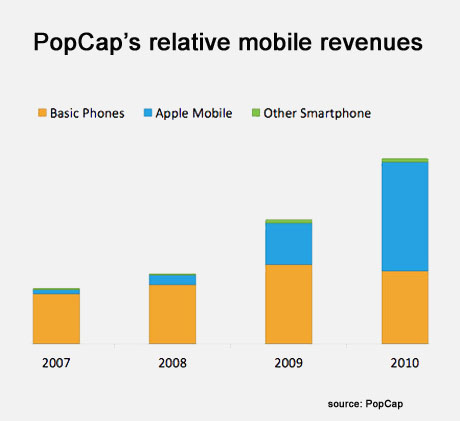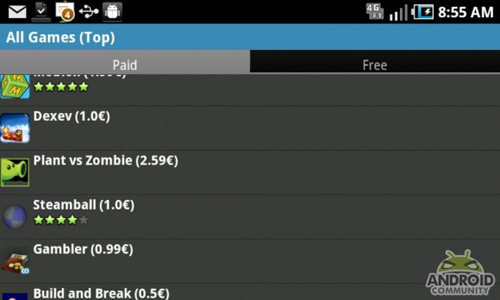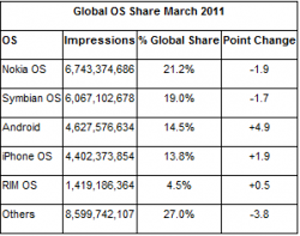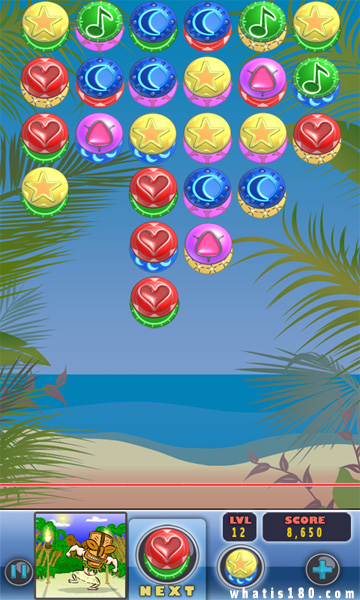每日观察:关注限时广告模式等海外手机游戏市场(4.15)
1.休闲游戏公司PopCap Games最近公布了其手机游戏业务在各个平台的分布情况,表示该公司手机业务占其销售额的三分之一左右。从PopCap的手机业务分布图中可以看出,其功能性手机业务(游戏邦注:PopCap的该类游戏由EA Mobile负责发行)在2009年达到高峰,但现在已呈现下滑趋势。
该公司在2010年推出《植物大战僵尸》的手机版游戏时,其iOS平台的业务获得极大发展,该公司去年的手机游戏营收约3000万美元。从该图表中还可以看出,PopCap在2010年的手机游戏业务将近2009年的两倍,而2010年的iOS业务约为2009年整个手机业务的85%。PopCap仅向Windows Phone 7发布了一款游戏,并且尚未涉足Android平台,所以该公司在其他智能手机平台上的营收极其有限。
2.IGDA(国际游戏开发者协会)日前发布了一封公开信,提醒开发者在向亚马逊Appstore投放产品前三思。该信内容主要将矛头指向亚马逊Appstore关于产品定价权的“不平等条约”,称这种不经过发行商同意就擅自调整游戏售价,并且不允许他们自己定价的做法,实际上限制了开发者跨平台运营的灵活性,这种定价策略只是利己手段,但并不会让开发者受益。
IGDA还通过该信呼吁亚马逊在给产品降价前先征求发行商意见,将自由定价权交还给开发者,并提醒人们注意:不可因亚马逊Appstore是新生事物,就无视它会成长为Android生态圈中的沃尔玛的这种可能性,要醒惕亚马逊Appstore政策条款将来被其他应用商店所效仿的情况。
3.手机游戏开发商Halfbrick的最新游戏《怪物狂奔》通过OpenFeint的交叉推广服务提升了下载量。OpenFeint的这项新服务名为“开发商公告”,它会向该开发商另一款游戏玩家通知最新游戏情报。OpenFeint通过这项服务,向Halfbrick热门手机游戏《水果忍者》用户推荐《怪物狂奔》,用户只要点击小小的推广工具条,即可下载安装该游戏。据Halfbrick工作室主管Phil Larsen所称,经过OpenFeint的推广,《怪物狂奔》在两天内的下载量飙升了123%,从苹果App Store免费应用榜单上的第143名,晋升到了第4名。在付费游戏榜单中的排名,也从原来的第267位上升到了第84位。
除了这项交叉推广服务,OpenFeint还向开发商提供了“每日限时特价游戏推荐”(游戏邦注:Free Game of the Day,即推荐一款原来付费,但限时免费的游戏)以及“Fire Sale”团购服务,以便更有利地刺激游戏下载量。
4.据市场调研公司Gartner最新报告预测,到2015年将有50%以上的企业或组织将采用“创新”的游戏化方式创建自己的解决方案。在最近几年,越来越多的公司都在采用类似游戏的机制,植入自己的非游戏应用程序(例如为完成特定任务的用户提供积分等各种奖励)。
Gartner报告称游戏化有助于增加用户黏性,通过推动反馈循环、提供明确的目标和游戏规则、展示富有吸引力的故事背景、增加任务挑战性等方法刺激人们进行创新。该公司预测到2014年,针对消费品牌市场营销活动的游戏化服务和用户留存率,其重要性将堪比Facebook、eBay和亚马逊等在线服务。届时全球前2000名的企业或组织,将有70%以上者至少拥有一个游戏化应用程序。
5.最近有些来自XDA论坛的开发者创建了一个名为“YAAM”的草根Android商店(游戏邦注:YYAM是Yet Another Android Market的简称,意为Android Market的替代选项),它的主要亮点在于不抽取任何营收分成,保证开发者回收100%的收益。该应用商店的美工设计非常简单,但已可支持开发者向其投放手机、平板电脑甚至是Google TV的应用程序,其运营宗旨是保障开发者的利益。目前共有2.3万用户以及400款应用程序,采用了PayPal计费服务系统,支持用户通过YAAM帐号付费下载应用。
6.据移动广告网站InMobi最近调查数据显示,2011年谷歌Android平台在该网站的全球广告印象份额中领先于苹果iPhone,其全球份额达14.5%,而苹果iOS则为13.8%,这是Android首次在InMobi网站超越iOS。不过在该网站的广告印象冠军仍然是诺基亚手机平台(包括Nokia OS和Symbian),独占了40%的份额。
7.谷歌最近透露Android手机和平板电脑每天的销量为35万部,如果按这种趋势来算,也就是每周245万部,每月1050万部,每年1.2775亿部。据谷歌2011年第一季财报电话会议消息显示,Android Market自上线以来,其应用下载量已超过了30亿次,但并未区分单个用户是否重复下载同款应用的情况。如果按这个标准来看,Android应用在今年第一季度的下载量,应该比去年第四季度上升了50%。
8.Headcase Games工作室在Android Market平台推出了付费下载、广告赞助之外的第三种营收模式——限时广告赞助模式。Android用户可选择花1.19美元购买《180 Ultra》这款无嵌入广告的物理游戏,也可以选择免费下载其免费版本,但在前面10个小时中得一边玩游戏一边观看广告。在这段广告时间过后,免费版游戏就不会再有任何广告痕迹,可提供与付费版本相同的无障碍游戏体验。
该工作室表示,通过这种创新营收渠道,他们获得了足够的广告和付费下载收益,辞掉了为大公司编码的工作,由此走上了自主创业之路。
1. PopCap saw mobile revenues rise 50% in 2010
You don’t need to be a genius to know sales of Java and Brew games are now dropping.
Few companies are explicit about the proportion of their business that comes from various mobile platforms though, so it’s surprising that PopCap has provided an insight into business trends.
It’s currently keen to demonstrate how fast it’s growing as it’s gearing up for an IPO sometime in 2011. As part of this, its been lifting the lid on its various operations, including mobile, which now makes up around a third of its sales.
Upwardly mobile
Talking to Business Insider’s Dan Frommer, the following unlabeled graph has come to light.
It shows that PopCap’s feature phone business – which is distributed through EA Mobile – peaked in 2009 and is now dropping.
Of course, the growth in iOS game sales, particularly in 2010 when PopCap released top grossing games such as Plants vs Zombies, has massively overcompensated.
It’s thought PopCap generated around $30 million via mobile game sales last year.
Throwing around some more rough figures, the height of 2010′s bar is 50 percent higher than 2009′s, while the iOS section in 2010 is 85 percent of 2009′s total.
Other smartphone revenues remain tiny as PopCap has only released one game on Windows Phone 7 and is still yet to make its Android debut.
Certainly, potential investors will be interested to hear how PopCap intends to grow the the height of the bright green part of its business over the next couple of years.(source:pocketgamer)
2.IGDA warns developers to think carefully before accepting Amazon’s Appstore terms
It may still be only available for residents of the US, but the Amazon Appstore for Android has certainly shaken up the Android ecosystem.
It was the first market to host Angry Birds Rio, and its Paid App for Free Every Day has distributed high quality games for free, driving downloads and visibility.
However, not everyone is happy.
The International Game Developers Association, a grassroots organisation, has released an open letter; what it calls a ‘Important Advisory about Amazon’s Appstore Distribution Terms’.
Misaligned goals
It claims, “Amazon has little incentive not to use a developer’s content as a weapon with which to capture marketshare from competing app stores.”
This argument is based on the terms that say Amazon can change the price of apps and games without the publisher’s permission. It does guarantee however that it will pay publishers 70 percent of the purchase price or 20 percent of the publisher’s preset list price; whichever is greater.
The IGDA also points out that Amazon’s terms say “developers cannot set their list price above the lowest list price available or previously available on any similar service,” limiting cross-platform business flexibility.
It then goes on to propose five scenarios in which Amazon could use price to its own advantage but perhaps not to the financial benefit of content creators.
Equality
To solve these concerns, the IGDA says Amazon (or any other app store) should be required to seek permission before discounting prices, and that developers should have the freedom to set a minimum list price, without regard to the price of their content in other app stores.
In this way, it calls on Amazon to response to its points, and developers to think carefully before submitting content to its store.
“It would be foolish to assume that because Amazon’s Appstore is small today, it will not become the Walmart of the Android ecosystem tomorrow”, the IGDA points out, warning that Amazon’s terms could be copied more widely by other app stores in time.(source:pocketgamer)
3.Halfbrick’s Monster Dash is a case study in mobile cross promotion
Mobile game maker Halfbrick made out like a bandit with its Fruit Ninja mobile game, selling its game to 23 million players. Now its latest game, Monster Dash, is starting to take off as well, thanks to Halfbrick’s alliance with the cross-promotion efforts of OpenFeint.
Today, Monster Dash is rising in downloads thanks to OpenFeint’s newest feature, dubbed “developer announcements.” The announcement lets a developer promote one game to a user who is playing another game from the same developer.
With Halfbrick’s Monster Dash, OpenFeint promoted the game so that users would see it while playing Fruit Ninja. If they tapped on the little promo, they could immediately install the game and play it. After OpenFeint did the cross promotion, Monster Dash’s downloads spiked 123 percent in two days, said Phil Larsen, head of Brisbane, Australia-based Halfbrick. The game also jumped from No. 143 on the Apple App Store to No. 4 in free apps. In paid apps, the game moved from No. 267 to No. 84.
OpenFeint has other ways for developers to get more players through promotions, such as Free Game of the Day and Fire Sale. The first offers a paid game as a free app for one day, while the Fire Sale uses a group-buying model to drive down the prices of premium games.(source:venturebeat)
4.Analyst: Over Half Of ‘Innovation’ Companies To Adopt Gamification By 2015
More than 50 percent of organizations that manage “innovation processes” for problem-solving will gamify those processes by 2015, according to a report from research firm Gartner.
More and more companies have embraced gamification, or the use of game-like mechanics in non-game applications (e.g. offering points or achievements for completing tasks), in recent years, employing the approach in a variety of different settings.
Gartner says gamification can help drive engagement, change behaviors, and stimulate innovation by accelerating feedback cycles, offering clear goals and rules of play, presenting a compelling narrative, and making its tasks challenging but achievable.
The group also predicts that by 2014, gamified services for consumer goods marketing and customer retention will be as important as online services like Facebook, eBay, and Amazon. It says over 70 percent of Global 2000-ranked organizations will have at least one gamified application.(source:gamasutra)
5.YAAM Android Market Means 100% Profit Share for Developers
Well what do you know, a fair deal for developers, could it be? It appears that a group of developers from XDA forums have created an Android Market alternative that allows creators of apps and games to grab 100% of the profit from their wares. In a move that seems nearly impossible without the backing of a major corporation, a few smalltime players have set themselves up for what might be a power move against the titans.
YAAM stands for Yet Another Android Market, a rather unassuming title for a project that could be such a big deal. The aesthetics of the market are just about as simple as they could be, the app itself works inside handsets, tablets, and even Google TV, and the whole business is centered around getting a fair deal for developers. Will it catch on? Only time and perhaps advertising will tell. Marketing is basically the biggest component in getting a project like this off the ground, as evidenced by Amazon’s push with a free app every day.
This market is currently said to play host to 23,000 users and 400 applications, a drop in the bucket compared to Google and Amazon’s markets, but impressive for a teeny tiny startup, if I do say so myself. And integration with PayPal – if they wanted to find a payment group that people trusted, they hit that right on the money. They’ve not got their orders completely set up enough for this writer to recommend everyone use it quite yet:
Paid applications are managed this way : You have a YAAM account, you send money on this account (via paypal, allopass, etc…), and you use this money into the application, to buy applications. In that way, you can easily manage your consommation…(source:slashgear)
6.InMobi: Android outpaces iOS globally
Yet another report has come out today claiming that Android has overtaken iOS globally. While this may mean very little to investors, the strategy behind Google’s geeky mobile OS has gained traction virtually everywhere it can, and InMobi is yet another firm to claim just that.
One thing that Google’s OS can now claim – and something you wouldn’t have thought twice about two years ago – is mindshare. Mindshare was something that always kept people coming back to Apple and its iPhone, and that still is the case for many. However, Android has grown up a lot over the past two years, and for every iPhone commercial you see on TV, there’re about 4 Android commercials. The OS is everywhere, and is now a household name that many people won’t forget when walking into a store to purchase a handset.
James Lamberti, VP Global Research & Marketing at InMobi commented on the most recent report, saying,
“The global smartphone revolution continues into Q2 2011. The introduction of Android has significantly accelerated smartphone growth, as it brings a wealth of options to consumers.”
To no surprise, the smartphone growth is on a meteoric rise, with Android leading the way.
Globally, Nokia still remains the leader in terms of marketshare, grabbing 40% (Nokia OS and Symbian), where Android follows with 14.5%, and iOS with 13.8%. This is the first time Android has eclipsed iOS share in the InMobi network. It’s worth noting that this particular network of sites is rather small. As Android’s momentum keeps churning, the gap between the two will only grow larger, but rest assured, Apple may sell less handsets, but it’s making more money off of you, which is a good thing if you’re a holder of Apple stock.(source:intomobile)
7.Google Android: 350,000 daily activations, 3 billion apps served
How many Android phones have been sold? Google has never given a concrete number, but the company has revealed how many Android phones and tablets are selling: 350,000 units each day.
Holding steady to estimates shared by Chairman Eric Schmidt in February, Google says it sells 350,000 Android phones or tablets each day. That’s 2.45 million per week, about 10.5 million per month, and 127.75 million per year if this trend holds.
It’s quite a feat to sell that many devices, but today’s totals don’t seem to have received much of a bump from the Motorola Xoom. One would think that the first Honeycomb tablet might have performed well enough to spike sales and send the daily activation numbers north of 350,000. Perhaps Google simply didn’t double-check figures before today’s earnings or the Xoom merely kept things steady as phone sales leveled off. Bottom line: there’s a boatload of Android devices shipping at every moment.
There have also been quite a few apps downloaded since Google opened the doors to the Android Market. According to news from today’s Q1 2011 earnings call, more than 3 billion apps have been served from the Android Market. Google didn’t breakdown how many of those apps were re-downloaded, so the number could be artificially inflated by people constantly wiping their phone to install new ROM’s or people who download one app multiple times when switching devices.
Either way, consider this telling stat: Android app downloads last quarter were up 50% since Q4 2010. Looks like it might be time to do a little housecleaning on our best Android apps list.(source:androinica)
8.Android developer uses unique selling point for “180″ game – limited ads
The Android Market typically hosts two types of Android apps: the kind you buy and the kind that are free thanks to the Google-sponsored ads that help the developer earn money.
Headcase Games is adding a third option to that rule – download the app and see apps only for the first few hours of gameplay. Android users can purchase 180 Ultra for $1.99 and never so much as look at an advertisement. Or, they can download the 180 free version and see ads only for the first 10 hours of gameplay. Afterwards, 180 removes all ads forever and becomes on parity with the paid version.
This is the first I’ve heard of a developer using a limited time advertisement as a revenue model. We’ve heard success stories of Car Locator making thousands of dollars and the same happening for Advanced Task Manager with ads. When we asked devs to tell us how much money they make off ads, several told us that they generate enough off ad revenue and sales to quit their day jobs coding for bigger companies.
But those revenues are possible because people continue to see and click advertisements. Headcase Games is attempting to generate money quickly rather than subject users to ads for the life of the product. This new revenue model is just an experiment that could become a permanent method for Headcase. Based on comments made on reedit, “the nice thing about tech these days is we can easily collect user feedback and futz with the method until we find a “sweet spot” that people are happiest with,” the developer said.
As for the game, 180 is a puzzle game with four playing modes and OpenFeint integration that seems pretty cool. Take a look at a video demo (it’s of the iOS version, but the game has been redone for Android with better graphics) and then see if you want to download the app.(source:androinica)












































 闽公网安备35020302001549号
闽公网安备35020302001549号